#flash to html5 migration
Explore tagged Tumblr posts
Text
E-learning content Development Company in Hyderabad Code and Pixels
E-Content development
At Code and Pixels, we believe that great training begins with great content.
Code and Pixels provides customised and current learning content that makes you stay competitive — right from knowledge transfer of company processes and systems to product information. Such technically heavy and complex content becomes a challenge for the trainer to deliver and difficult for end users to consume in conventional training formats. Hence,
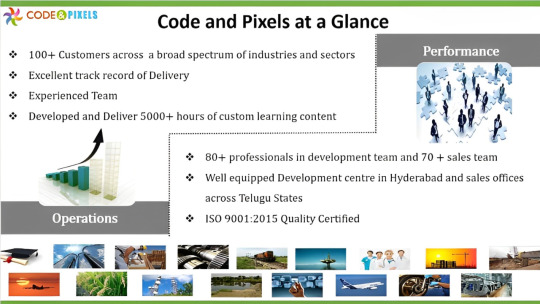
We develop custom E-learning content which is:
Sound using instructional design principles and pedagogy
Compliant with international E-learning standards
A combination of multiple media — games, quizzes, tests, simulations, video, animation, audio and graphics.
Compatible and runs on any standard Learning Management System (LMS)
Highly interactive and enables tracking and scoring of each learner’s progress
Multilingual
We employ a multitude of technologies and tools like graphics, animations, audio-visuals, interactive games and activities that help in giving the right information in the right manner to the right audience.
Mobile Learning/HTML 5
We are living in a multi-device world. We now have options to deliver eLearning using a wide variety of devices such as desktops, laptops, tablets and smart phones. Whether it is for smart phones or tablets — using platforms like Android, BlackBerry or iOS– we develop any kind of solution which suits your mobile learning needs perfectly.
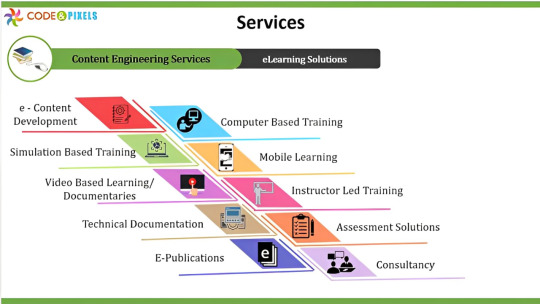
What Is HTML5?
HTML5 is the newest hyper text markup language for websites from the World Wide Web Consortium (W3C). The first draft was made public in 2008, but not much happened until 2011. In 2011, HTML5 was released and people started writing about it and using it, but the support in different browsers was still poor. Today all major browsers (Chrome, Safari, Firefox, Opera, IE) offer HTML5 support, therefore the newest HTML technology can be used at its best today.
Major browsers
IE9+, FF4+, Safari5+, Opera11+, Chrome10+, Blackberry Browser, Silk
Platforms
iOS, Android, ChromeOS, BlackberryOS, Symbian, Windows Mobile 7.5+
Libraries
Webkit (Google, Apple, etc.), Gecko (Mozilla), Trident (Microsoft), Presto (Opera)
A reality indeed. As HTML5’s impact continues to ripple, many companies are dealing with the necessity of abandoning Flash applications. HTML5 is more flexible, allows movement, doesn’t affect SEO and doesn’t need a plug-in.
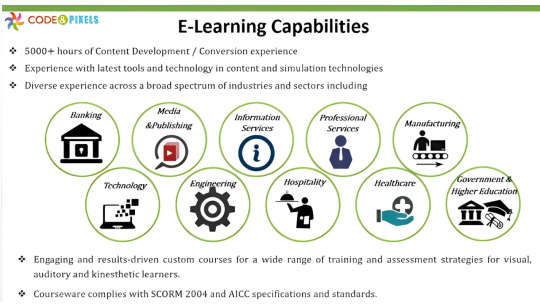
The migration of Flash eLearning courses to HTML5
eLearning, Training, Media organizations andmarketing departments of all kinds of companies have huge volumes of Interactive Flash content that has traditionally been consumed on desktops. With the rapid proliferation of smart phones and tablets, enterprises are faced with the prospect of their existing content becoming obsolete, since popular mobile platforms don’t support Interactive Flash.
While new content can be developed on a platform an industry standard format like HTML5, ground-up redevelopment of existing Interactive Flash content for mobile devices is not an option for most enterprises. What they need is a high-quality yet rapid solution for migrating their legacy of Interactive Flash content to HTML5.
Flash to HTML5 Migration
We shall take your existing Interactive Flash content and use the Flash to HTML Framework to re-purpose it to make it usable and HTML5 content that is suitable for a variety of devices including desktops, smart phones & tablets.
Powered by HTML5, CSS3 and JavaScript, our Flash to HTML5 framework enables us to accelerate speed-to-market for the new HTML5 content while preserving the richness of the original Flash content.
The new HTML5 content is able to fulfill the greater demands on usability posed by the varying screen sizes and resolutions of mobile devices. Recognizing that mobile devices don’t always have the same processing horsepower of desktops, our migration/conversion process leverages our framework to ensure that the repurposed HTML5 can perform on the most popular mobile platforms.
The framework adheres to content standards and supports various fundamental interactive behaviors like programmed workflows, directional information, enhanced content Menus, Multimedia Content Delivering, 2D Animations, Voice Synchronization, Interactivity, Status Bar, Volume Controllers, Slide Bar, Bookmark, Search, Standard navigation features i.e. Next, Previous, Menu amongst several others
With mobile devices being used and preferred for numerous multimedia applications, we shouldn’t forget something that Apple first pointed out. Flash does use too much processing and battery power; something that makes it disadvantageous. So migration to HTML becomes unavoidable.
In a continuously changing and fast paced environment, we can’t chain users to their desks and offices. So the creation of HTML5 eLearning applications, training material, presentations etc. or the conversion of Flash to HTML for mobile devices has become inevitable.
#E-learning#E-learning software#E-learning standards#Learning Management System#eLearning applications#ietm#ietm code and pixels ietm hyderabad#code and pixels#ietm developement#ietm level iv#elearning#ietm software#ietm level 4#technology#software#paradisosolution#mmgen2
1 note
·
View note
Link
Adobe Flash was undeniably the ever-popular and gold standard of creating eLearning courses that was completely rich in high-level interactivity, engaging animation, visuals, accessibility, variety, uniformity, etc. Unfortunately, incompatibility problems and slow progress have now-a-days made Flash a fewest option.
While learning methodologies took the digital path, inevita flash courses to html5 which became new favorite among eLearning professionals.
Hypertext Markup language 5 (HTML5) is the extremely developed, latest, stable and scalable HTML format that best serves in designing and developing eLearning courses to meet global audience's diverse needs across platforms.
#flash to html5 conversion#flash to html5 conversion services#convert flash to html5#flash to html5#outsource flash to html5 conversion#flash to html5 elearning#flash to html5 elearning services#flash to html5 elearning solutions#flash elearning to html5#convert flash to html5 courses#flash to html5 content#flash to html5 migration#flash to html5 migration services#flash to html5 migration solutions#convert flash to html5 services#convert flash course to html5#converting from flash to html5#convert flash into html5#migrate flash to html5#convert adobe flash to html5#converting flash to html5#convert flash website to html5#how to convert flash to html5#flash courses to html5#flash to html5 conversion solutions
2 notes
·
View notes
Link
Who knows, new smartphones may emerge numerously year by year and may last till the world ends. This incremental development in the technology affects the eLearning industry and give way to discover new technologies to deliver the digital learning solutions such that to meet the learner requirement.
Elearning developers are now switching from flash technology to HTML5 because most of the mobile devices don’t prefer Flash plugin. Hence the organizations are making their move towards the conversion of flash to html5 elearning. There are many elearning authoring tools such as Articulate Storyline, Lectora Inspire, Adobe Captivate, Camtasia, iSpring, etc., that are used in the HTML5 conversion process.
#flash to html5#flash to html5 conversion#convert flash to html5#authoring tools#elearning content#flash content to html5#legacy course conversion#flash to html5 elearning#digital learning solutions#flash#html5#how to convert flash to html5?#elearning#flash to html5 conversion services#flash to html5 conversion solutions#convert flasah to html5 services#convert flash to html5 solutions#convert flash to html5 services#flash to html5 migration#flash to html5 migration services#flash to html5 migration solutions
1 note
·
View note
Link
Looking for Flash to HTML5 conversion? Swift eLearning services help companies to Convert Flash to HTML5 eLearning courses for effective training programs.
#flash to html5 conversion#flash to html5 conversion services#convert flash to html5#flash to html5#outsource flash to html5 conversion#flash to html5 elearning#flash elearning to html5#convert flash to html5 courses#flash to html5 content#flash to html5 migration
2 notes
·
View notes
Link
Start your Flash to HTML5 conversion, Swift elearning services helps companies to Convert Flash to HTML5 elearning courses for effective training programs.
#flash to html5 conversion#flash to html5 conversion services#convert flash to html5#flash to html5#outsource flash to html5 conversion#flash to html5 elearning#flash elearning to html5#convert flash to html5 courses#flash to html5 content#flash to html5 migration#flash to html5 migration solutions#flash to html5 migration services#flash to html5 conversion solutions#convert flash to html5 solutions#convert flash to html5 services#convert flash to html5 companies#rapid elearning development#elearning#elearning development#elearning development services
1 note
·
View note
Link
Adobe Flash was undeniably the ever-popular and gold standard of creating eLearning courses that was completely rich in high-level interactivity, engaging animation, visuals, accessibility, variety, uniformity, etc. Unfortunately, incompatibility problems and slow progress have now-a-days made Flash a fewest option.
While learning methodologies took the digital path, inevitable thanks to the wave of modern standards in the world of eLearning i.e., HTML5 which became new favorite among eLearning professionals.
Hypertext Markup language 5 (HTML5) is the extremely developed, latest, stable and scalable HTML format that best serves in designing and developing eLearning courses to meet global audience's diverse needs across platforms.
#flash to html5 conversion#flash to html5 conversion services#convert flash to html5#flash to html5#outsource flash to html5 conversion#flash to html5 elearning#convert flash to html5 courses#flash to html5 migration#flash to html5 conversion solutions#flash to html5 conversion providers#flash to html5 conversion companies#convert flash to html5 services#convert flash to html5 solutions
1 note
·
View note
Link
A decade before when Adobe Flash was a major authoring tool for custom eLearning development, most of the companies invested their valuable time and money in building interactive, engaging and animated online courses. As Adobe will end support of Flash Player on December 31, 2020, all the Flash based courses need to re-build using another tool which supports HTML5.
Here is a case study on conversion of Adobe Flash courses to HTML5.
#cost reduction techniques for flash to html5#converting from flash to html5#convert flash into html5#migrate flash to html5#convert adobe flash to html5#converting flash to html5#how to convert flash to html5#flash courses to html5#convert flash course to html5#flash to html5 migration#flash to html5
0 notes
Link
Welcome to html5 universe. Very frequently, you may hear these terms or phrases that' flash must die,'' flash will become redundant,' or' flash is already dead,' and it's very clear that you've landed on the right place.
At least some of the courses which were established in Flash are constituted by each organization. And now the key services most eLearning vendors deliver
For more information, please visit: Flash to HTML5 Conversion Services
#flash to html5 conversion#flash to html5 conversion services#convert flash to html5#flash to html5#outsource flash to html5 conversion#flash to html5 elearning#flash elearning to html5#convert flash to html5 courses#flash to html5 content#flash to html5 migration
0 notes
Link
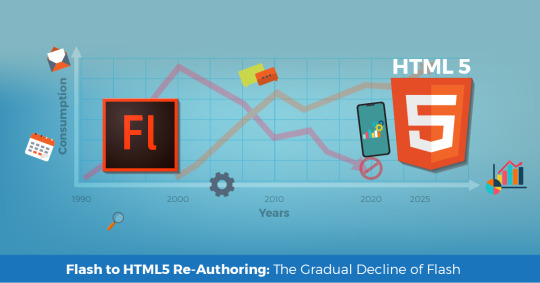
Why is converting Flash to HTML5 a top priority in organizations? Flash is on a decline and HTML5 is on the rise in e-learning. Any idea why? There are many reasons for migrating from flash to HTML5. Check out these reasons & benefits of converting Flash to HTML5.
#Flash to HTML5 Re-authoring Flash to HTML5 Conversion Flash to HTML5 Migration Why HTML5 reasons of Flash to HTML5 Conversion.#Flash to HTML5 Re-authoring#Flash to HTML5 Conversion#Flash to HTML5 Migration#Why HTML5#reasons of Flash to HTML5 Conversion
0 notes
Link
The corona outbreak has shown the “great potential” of remote learning, saying many experts from the training and development industry. Implementing rapid elearning development that can speed up the training process within no time. That allows training managers to plan their training programs according to a scheduled timeline, instead of waiting days for more conventional training methods, experts say.
#coronavirus outbreak#elearning#corporate training#work from home#interactive training#powerpoint presentations#classroom training#covid19#remote learning platforms#employee training#rapid elearning development#custom elearning#custom elearning development#custom elearning services#custom elearning solutions#training process#elearning localization#elearning translation#migration of flash to html5#corporate learning#rapid elearning#rapid elearning services#rapid elearning solutions#convert ppt to elearning#convert powerpoint to elearning#convert powerpoint to elearning services#convert powerpoint to elearning solutions#convert ppt to elearning services#convert ppt to elearning solutions
1 note
·
View note
Link
The corona outbreak has shown the “great potential” of remote learning, saying many experts from the training and development industry. Implementing rapid elearning development that can speed up the training process within no time. That allows training managers to plan their training programs according to a scheduled timeline, instead of waiting days for more conventional training methods, experts say.
#coronavirus outbreak#elearning#corporate training#interactive training#powerpoint presentations#classroom training#covid19#remote learning platforms#employee training#rapid elearning development#rapid elearning#custom elearning#elearning localization#elearning translation#migration of flash to html5#custom elearning services#rapid elearning services#custom elearning solutions#falsh to html5 conversion
1 note
·
View note
Link
The corona outbreak has shown the “great potential” of remote learning, saying many experts from the training and development industry. Implementing rapid elearning development that can speed up the training process within no time. That allows training managers to plan their training programs according to a scheduled timeline, instead of waiting days for more conventional training methods, experts say.
#coronavirus outbreak#elearning#corporate training#work from home#interactive training#powerpoint presentations#classroom training#covid19#remote learning platforms#employee training#rapid elearning development#custom elearning#training process#elearning localization#elearning translation#migration of flash to html5#corporate learning
1 note
·
View note
Link
Undoubtedly, Adobe Flash was ever-popular and gold-standard of eLearning course creation that was absolutely rich in high level interactivity, engaging animation, graphics, flexibility, diversity, uniformity, etc. Unfortunately, incompatibility issues and Stagnant progress has made Flash a fewest option now-a-days. adobe flash shutting down.
#html5#html5 elearning#convert from flash to html5#converting flash to html5#converting from flash to html5#flash to html5 conversion#flash to html5 conversion solutions#flash to html5 conversion services#convert flash to html5#convert flash to html5 services#convert flash to html5 solutions#flash convert to html5#convert flash elearning to html5#convert flash scorm to html5#flash to html5 migration#flash to html5 migration services#flash to html5 migration solutions#mobile learning#elearning development
1 note
·
View note
Link
Adobe Flash was undeniably the ever-popular and gold standard of creating eLearning courses that was completely rich in high-level interactivity, engaging animation, visuals, accessibility, variety, uniformity, etc. Unfortunately, incompatibility problems and slow progress have now-a-days made Flash a fewest option.
While learning methodologies took the digital path, inevitable thanks to the wave of modern standards in the world of eLearning i.e., HTML5 which became new favorite among eLearning professionals.
Hypertext Markup language 5 (HTML5) is the extremely developed, latest, stable and scalable HTML format that best serves in designing and developing eLearning courses to meet global audience's diverse needs across platforms.
Start your Flash to HTML5 conversion, Swift elearning services helps companies to Convert Flash to HTML5 elearning courses for effective training programs.
#flash to html5 conversion#flash to html5 conversion services#convert flash to html5#flash to html5#outsource flash to html5 conversion#flash to html5 elearning#flash elearning to html5#convert flash to html5 courses#flash to html5 content#flash to html5 migration#flash to html5 conversion solutions#convert flash to html5 services#convert flash to html5 solutions#flash to html5 services#flash to html5 solutions#flash to html5 elearning services#flash to html5 elearning solutions#conversion of flash to html5#conversion of flash to html5 services
1 note
·
View note
Photo
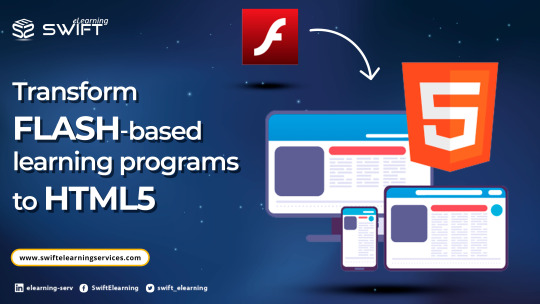
Your Flash-based courses can now no longer be accessed in the modern browsers. But worry not! Our Flash to HTML5 Conversion services help you to migrate your flash courses to HTML5 which will help you to make your precious training content future-proof.
#Flash#browsers#migrate#trainingcontent#Conversion#FlashtoHTML5#legacycourses#responsivelearning#flashconversion#flashtohtml5conversionservices#flashcourses#multibrowser#html5
0 notes
Link
Legacy eLearning courses are the courses that were developed in the 1990's or through 2012. It is a generalized estimate made dependent on the introduction of new eLearning developments as of 2012. In order to satisfy new learning requirements and challenges such as responsive and mobile compatibility, the courses developed prior to this time are considered obsolete or legacy courses and required enhancement.
#authoring tools#elearning courses#elearning industry#elearning migration#elearning requirements#elearning technologies#engaging elearning course#flash#flash to html5 conversion
0 notes